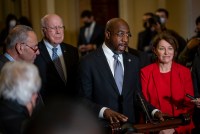Latest KFF Health News Stories
To Keep Medicaid, Mom Caring for Disabled Adult Son Faces Prospect of Proving She Works
A proposed work requirement would make Medicaid expansion enrollees prove they’re working or meet other criteria. Most already work, but millions are expected to lose coverage if the provision passes, many from red tape. A Missouri mother who cares for her disabled son would probably be subject to the rule.
Trump’s ‘One Big Beautiful Bill’ Continues Assault on Obamacare
The domestic policy legislation the House advanced in May includes the most substantial rollback of the Affordable Care Act since President Donald Trump and his Republican allies tried to pass legislation in 2017 that would have largely repealed President Barack Obama’s signature domestic accomplishment.
What the Health? From KFF Health News: Bill With Billions in Health Program Cuts Passes House
The House narrowly passed a budget reconciliation bill, including billions of dollars in tax cuts for the wealthy along with billions of dollars in cuts to health program spending. But the Senate is expected to make major changes to the measure before it can go to President Donald Trump for his signature. This week’s panelists are Julie Rovner of KFF Health News, Anna Edney of Bloomberg News, Sarah Karlin-Smith of the Pink Sheet, and Alice Miranda Ollstein of Politico.
Medi-Cal Under Threat: Who’s Covered and What Could Be Cut?
Federal law requires states to offer health insurance to many people with low incomes or disabilities. But some states, including California, are far more generous than what’s required. Budget pressures may force lawmakers to cut benefits that have led to a historic low in the uninsured rate.
In Montana, Conservative Groups See Chance To Kill Medicaid Expansion
Conservative groups are working to undermine support for Montana’s Medicaid expansion ahead of a political fight over whether to keep the program.
Presidential Election Puts Affordable Care Act Back in the Bull’s-Eye
The outcome of the upcoming presidential election could affect the number of insured Americans, the fate of premium-reducing subsidies, the shape of Medicaid, and the cost of coverage for tens of millions of people.
What the Health? From KFF Health News: LIVE From KFF: Health Care and the 2024 Election
The Affordable Care Act has not been a major issue in the 2024 campaign, but abortion and reproductive rights have been front and center. Those are just two of the dozens of health issues that could be profoundly affected by who is elected president and which party controls Congress in 2025. In this special live episode, Tamara Keith of NPR, Alice Miranda Ollstein of Politico, and Cynthia Cox and Ashley Kirzinger of KFF join KFF Health News chief Washington correspondent Julie Rovner to discuss how health policy has affected the campaign and how the election results might affect health policy. Plus, the panel answers questions from the live audience.
In New Year, All Immigrants in California May Qualify for Medicaid Regardless of Legal Status
In the new year, California’s Medicaid program will open to otherwise eligible immigrants ages 26 to 49 without legal residency. They will join children, young adults, and adults over 50 enrolled in Medi-Cal through previous expansions to residents lacking authorization. The change is expected to add over 700,000 first-time enrollees.
Los nuevos inscritos se sumarán a más de 655,000 niños, adultos jóvenes de hasta 25 años y adultos de 50 años y más que ya se han registrado en Medi-Cal a través de expansiones anteriores para residentes sin papeles.
KHN’s ‘What the Health?’: Medicaid Machinations
The lame-duck Congress has returned to Washington with a long health care to-do list and only a little time. Meanwhile, some of the states that have not yet expanded Medicaid eligibility under the Affordable Care Act are rethinking those decisions. Alice Miranda Ollstein of Politico, Rachel Cohrs of Stat, and Sarah Karlin-Smith of the Pink Sheet join KHN’s Julie Rovner to discuss these topics and more. Also this week, Rovner interviews KHN’s Fred Clasen-Kelly, who reported and wrote the latest KHN-NPR “Bill of the Month” feature, about a mysterious mishap during minor surgery.
KHN’s ‘What the Health?’: The Midterm Shake-Up
Election night went better than expected for Democrats. Although they could still lose control of one or both houses of Congress, the predicted “red wave” for Republicans failed to materialize. Meanwhile, voters in both red and blue states approved ballot measures to protect abortion rights. Alice Miranda Ollstein of Politico, Rachel Cohrs of Stat, and Sarah Karlin-Smith of the Pink Sheet join KHN’s Julie Rovner to discuss these topics and more. Also this week, Rovner interviews Carolee Lee, the former jewelry magnate, about her efforts to boost gender equity in medical research.
South Dakota Voters Approved Medicaid Expansion, but Implementation May Not Be Easy
South Dakotans voted to expand the state’s Medicaid program to cover thousands of additional low-income residents. But as other conservative states have shown, voter approval doesn’t always mean politicians and administrators will rush to implement the change.
Impending Hospital Closure Rattles Atlanta Health Care Landscape and Political Races
The nonprofit owners of Atlanta Medical Center, a 460-bed Level 1 trauma center in the heart of the city, plan to close the hospital in November. As many community members worry about the hole the closure will leave in the city’s safety net, the news has thrust health care into the political spotlight less than two months before Election Day.
Medical Bills Can Shatter Lives. North Carolina May Act to ‘De-Weaponize’ That Debt.
Medical debt is most prevalent in the Southeast, where states have not expanded Medicaid and have few consumer protection laws. Now, North Carolina is considering two bills that could change that, making the state a leader in protecting patients from high medical bills.
South Dakota Voters to Decide Medicaid Expansion
Despite state Republican leaders’ rigid opposition to expanding the health program designed for low-income residents, advocates successfully gathered enough signatures to get the measure on the fall ballot.
Uninsured in South Would Win Big in Democrats’ Plan, but Hospitals Fear Funding Loss
The latest iteration of President Joe Biden’s social-spending package would close the health insurance gap for at least 2.2 million people, making a huge difference especially in the South, where political opposition has blocked Medicaid expansion.
KHN’s ‘What the Health?’: Much Ado About Drug Prices
Democrats have hit a snag in their effort to compile a $3.5 trillion social-spending bill this fall — moderates are resisting support for Medicare drug price negotiation provisions that would pay for many of the measure’s health benefit improvements. Meanwhile, the new abortion restrictions in Texas have moved the divisive issue back to the political front burner. Alice Miranda Ollstein of Politico, Rachel Cohrs of Stat and Shefali Luthra of The 19th join KHN’s Julie Rovner to discuss these issues and more. Also this week, Rovner interview’s KHN’s Phil Galewitz about the latest KHN-NPR “Bill of the Month” installment, about two similar jaw surgeries with very different price tags.
KHN’s ‘What the Health?’: The Senate Acts
The U.S. Senate worked well into its scheduled August recess to pass a bipartisan infrastructure bill and a budget blueprint that outlines a much larger bill — covering key health priorities — to be written this fall. Meanwhile, the latest surge of covid is making both employers and schools rethink their opening plans. Joanne Kenen of Politico, Mary Ellen McIntire of CQ Roll Call and Yasmeen Abutaleb of The Washington Post join KHN’s Julie Rovner to discuss these issues and more. Also, for “extra credit,” the panelists suggest their favorite health policy stories of the week they think you should read, too.
Feds to Nix Work Requirements in Montana Medicaid Expansion Program
State health officials say the federal government will likely reject any work or community engagement requirements, which were key to Republican lawmakers agreeing to extend the program that insures 100,000 low-income Montana adults.
At Texas Border, Pandemic’s High Toll Lays Bare Gaps in Health and Insurance
In Texas’ border communities, which are overwhelmingly Hispanic, covid-19 death rates for people under age 65 were double those in the rest of the state and three times the national average. They were also significantly higher than rates in New Mexico border areas.






















